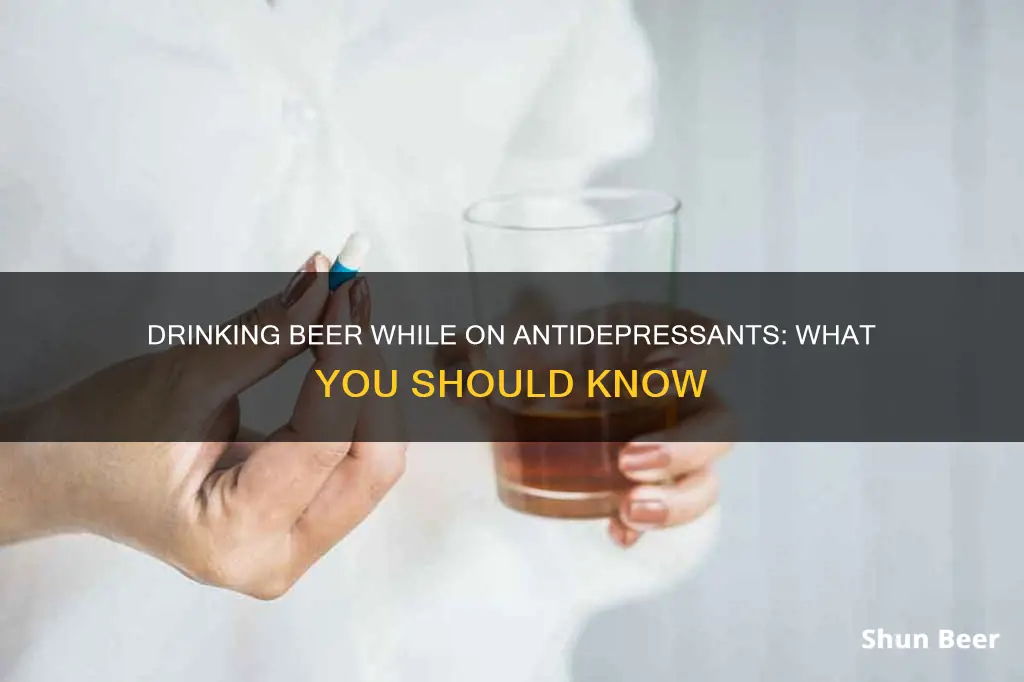
Drinking alcohol while taking antidepressants can lead to many adverse effects on the body and mind. Alcohol is a hypnotic-sedative, and as such, it depresses crucial bodily functions when consumed in excess. Mixing alcohol and antidepressants is generally not recommended, as the combination can worsen the effects of alcohol, while alcohol can worsen antidepressant side effects. While some doctors may allow their patients to drink moderately, caution should be exercised.
| Characteristics | Values |
|---|---|
| Is it safe to drink 3 beers on anti-depressants? | Generally not recommended due to adverse health effects and safety concerns |
| What are the potential dangers? | Amplified side effects such as drowsiness, dizziness, and discoordination; heightened risk of suicidal thoughts; liver damage; worsening of depression and anxiety symptoms |
| Are there any specific types of antidepressants that should be avoided when drinking alcohol? | Monoamine oxidase inhibitors (MAOIs) due to dangerous spikes in blood pressure |
| What if someone wants to drink while on antidepressants? | Consult a doctor to discuss medication, medical history, and risks; exercise caution by drinking slowly and eating while drinking |
What You'll Learn

Increased side effects
Drinking alcohol while taking antidepressants can increase the severity of the medication's side effects. Alcohol can amplify the side effects of antidepressants, such as drowsiness, dizziness, and discoordination. This can cause disruption to your life and present a danger to those around you.
The combination of alcohol and antidepressants can impair a person's coordination and cause confusion and severe drowsiness. This can lead to an increased risk of falls and injuries. Even if a person's blood alcohol content is below the legal limit, alcohol mixed with an antidepressant will intensify feelings of drowsiness and loss of coordination.
Additionally, alcohol can worsen the side effects of specific types of antidepressants. For example, tricyclic antidepressants (TCAs) can make people feel tired and uncoordinated, and monoamine-oxidase inhibitors (MAOIs) can cause a dangerous increase in blood pressure when mixed with alcohol.
It is important to note that the effects of mixing alcohol and antidepressants can vary depending on the type of antidepressant, the amount of alcohol consumed, and individual factors. However, in general, it is recommended to avoid mixing alcohol and antidepressants to reduce the risk of increased side effects.
Drinking Beer in Liverpool Streets: What's the Law?
You may want to see also

Worsened depression or anxiety
Drinking alcohol while taking antidepressants can have serious consequences for your mental health, including worsening symptoms of depression and anxiety. Alcohol is a depressant, which means it can intensify the very symptoms that antidepressants aim to alleviate. This can create a vicious cycle, where alcohol consumption worsens depression, which then leads to increased alcohol consumption.
Mixing alcohol and antidepressants can also lower inhibitions related to suicidal thoughts and tendencies. This is a particularly dangerous consequence of drinking alcohol while taking antidepressants, as it can put people at a higher risk of suicide.
In addition to worsening depression, alcohol can also negatively impact the effectiveness of antidepressant medication. It can reduce the intended therapeutic effect of the medication and interfere with how the medication is meant to alter the chemical balance in the brain. This can make antidepressants less effective at treating the symptoms of depression and anxiety.
The combination of alcohol and antidepressants can also lead to unpleasant and unpredictable side effects, such as drowsiness, dizziness, impaired motor control, and an increased risk of overdose. These side effects can be dangerous and may require emergency medical attention.
Furthermore, certain types of antidepressants, such as tricyclic antidepressants (TCAs) and monoamine oxidase inhibitors (MAOIs), are especially risky to mix with alcohol. Drinking alcohol while taking these types of antidepressants can cause dangerous spikes in blood pressure and increase the risk of serious cardiovascular issues, such as hypertensive stroke.
Overall, it is important to recognize that drinking alcohol while taking antidepressants can have significant negative consequences for mental health, including worsening depression and anxiety. It can also lead to unpredictable side effects and interfere with the effectiveness of the medication. To ensure safe and effective use of antidepressants, it is crucial to avoid alcohol consumption and follow the advice of a healthcare professional.
Beer and Doxycycline: Is It Safe to Mix?
You may want to see also

Impact of tricyclic antidepressants (TCAs)
It is not advisable to consume alcohol while on antidepressants. Alcohol can worsen symptoms of depression, making the condition harder to treat. It can also increase the risk of and worsen side effects such as drowsiness or dizziness, as well as increase the risk of overdose. Mixing alcohol with certain types of antidepressants, such as monoamine-oxidase inhibitors (MAOIs), can lead to serious cardiovascular issues, including high blood pressure and hypertensive stroke.
Now, let's focus on the impact of tricyclic antidepressants (TCAs).
Tricyclic antidepressants (TCAs) are a class of medications that are primarily used to treat symptoms of major depressive disorder. They are also sometimes prescribed for other conditions, such as chronic pain, insomnia, migraine prevention, and obsessive-compulsive disorder (OCD). TCAs were among the first types of antidepressants developed and are considered "first-generation" medications.
The impact of TCAs on the body is significant. Firstly, they increase the levels of norepinephrine and serotonin in the brain, which play a crucial role in regulating mood and behavior. Secondly, they block certain receptors in the body, leading to adverse side effects such as dry mouth and urinary retention. TCAs also affect automatic muscle movement for functions like secretions and digestion. Additionally, they block the effects of histamine, which can cause drowsiness, blurred vision, dry mouth, constipation, and glaucoma.
One of the critical considerations regarding TCAs is their potential for harmful side effects. They are known to cause more significant adverse effects compared to other types of antidepressants, such as selective serotonin reuptake inhibitors (SSRIs). TCAs are more likely to lead to constipation, weight gain, and sedation. In some cases, they can cause serious cardiovascular complications, especially in individuals with pre-existing ischemic heart disease. For this reason, healthcare providers may order an electrocardiogram (EKG) before starting a patient on TCAs.
TCAs also pose risks for certain vulnerable populations. They are generally not considered safe during pregnancy, as studies have linked their use to birth defects affecting the fetus's eyes, ears, face, and neck. Additionally, children, teens, and young adults under 25 may experience an increase in suicidal thoughts or behavior when taking TCAs.
Furthermore, TCAs have a high risk of toxicity and overdose. An overdose can occur accidentally, unknowingly, or intentionally, and it can be fatal if not treated promptly. Symptoms of a TCA overdose include heart rhythm issues.
While TCAs are effective in treating depression, they are typically not the first-line treatment due to their potential for adverse effects. Healthcare providers usually prescribe them after other antidepressants have failed to relieve symptoms or in cases where TCAs may be more effective for specific individuals.
Beer and the Flu: A Safe Mix?
You may want to see also

Increased risk of alcoholism
Drinking alcohol while taking antidepressants can increase the risk of developing alcoholism. Alcohol is one of the most commonly abused substances globally, and when people are unable to control their drinking, they may be suffering from alcoholism, also known as Alcohol Use Disorder (AUD). Mixing alcohol with antidepressants can lead to amplified effects on the body, resulting in adverse health issues and safety concerns.
The risk of developing alcoholism is heightened when combining alcohol and antidepressants, especially for those with a history of depression. This combination can increase the likelihood of end-stage alcoholism, along with feelings of hopelessness, worthlessness, and emptiness. Additionally, alcohol may increase the side effects of antidepressant medications, and vice versa. Liver damage from liver toxicity can occur as both alcohol and some medications are processed by the liver, causing additional strain.
The co-occurrence of alcohol addiction and depression can create a maladaptive cycle. Alcohol can worsen depression, and depression can lead to increased alcohol consumption. This cycle can result in more severe outcomes than either disorder alone, including an elevated risk of suicidality. People with an AUD are 2.3 times more likely to have also suffered from depression in the previous year.
Furthermore, certain types of antidepressants, such as monoamine oxidase inhibitors (MAOIs), should not be mixed with alcohol due to the dangerous spike in blood pressure that can occur. This combination can lead to serious cardiovascular issues, including high blood pressure and hypertensive stroke, which can be fatal. Therefore, it is generally recommended to avoid drinking alcohol while taking antidepressants to eliminate the risk of adverse complications.
Liquid Diets and Beer: Is It Allowed?
You may want to see also

Liver damage
While antidepressants are commonly prescribed to treat depression, they can also be used to treat other conditions such as obsessive-compulsive disorder, generalized anxiety disorder, post-traumatic stress disorder, and certain types of chronic pain. It is important to note that people who take antidepressants should be aware of the dangers of mixing these medications with alcohol.
Alcohol can worsen symptoms of depression, making it more difficult to treat. Additionally, mixing alcohol with antidepressants can increase the risk of side effects such as drowsiness or dizziness and may also increase the risk of overdose. In some cases, it can even be fatal, as alcohol can change the way antidepressants work, making them less effective and potentially increasing suicidality.
Furthermore, drinking alcohol while taking antidepressants can also lead to serious medical conditions like liver disease. All antidepressant drugs have the potential to cause drug-induced liver injury (DILI), even at recommended doses. French researchers have found that antidepressant liver toxicity has been underestimated in scientific literature. In some cases, antidepressant-induced liver injury can be irreversible.
The interval between treatment initiation and the onset of liver injury can range from several days to six months. Liver damage is often idiosyncratic and unpredictable and is generally unrelated to drug dosage. However, certain groups are more vulnerable than others, including elderly patients and those with polypharmacy.
The antidepressants associated with the highest risk for hepatotoxicity include monoamine oxidase (MAO) inhibitors, tricyclic/tetracyclic antidepressants, nefazodone, bupropion, duloxetine, and agomelatine. On the other hand, those with seemingly lower risks include citalopram, escitalopram, paroxetine, and fluvoxamine.
It is important for patients taking antidepressants to be aware of the possibility of liver abnormalities and to report any clinical symptoms suggestive of liver problems. If jaundice develops, treatment with antidepressants should be discontinued immediately.
Beer and Dieting: Can You Have Your Cake and Drink, Too?
You may want to see also
Frequently asked questions
It is not recommended to drink alcohol while taking anti-depressants. Mixing the two can lead to adverse effects such as dizziness, drowsiness, increased blood pressure, and a heightened risk for suicidal ideation. Alcohol can also worsen symptoms of depression, making them more difficult to treat.
Mixing alcohol and anti-depressants can lead to amplified effects on the body, resulting in various health issues and safety concerns. Both substances can increase feelings of drowsiness and dizziness, impair coordination, and cause confusion. This combination can also negatively impact the liver, as both alcohol and certain anti-depressants are processed by the liver, which can lead to liver damage or reduced liver function.
It is important to consult with a healthcare professional to discuss your specific situation, medication, and medical history. Some doctors may allow their patients to drink moderately, but caution should be exercised. Patients should drink slowly and eat food while drinking to decrease the effects of alcohol.







